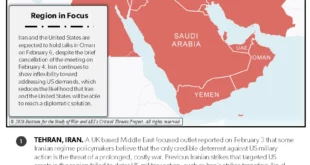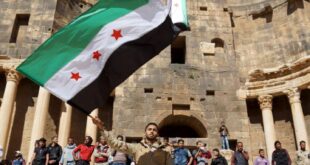 NAJAF, Iraq (Reuters) – Powerful Iraqi Shi’ite cleric Moqtada al-Sadr, who has not been seen in public for months, issued an unusual statement on Friday explaining his absence to his followers and admitting splits in his movement.
NAJAF, Iraq (Reuters) – Powerful Iraqi Shi’ite cleric Moqtada al-Sadr, who has not been seen in public for months, issued an unusual statement on Friday explaining his absence to his followers and admitting splits in his movement.
“I swear that I live with you and among you. I am a part of you. I will not change this unless death separates us,” he said in a two-page statement bearing his personal stamp.
Sadr, who rarely issues statements, acknowledged that his followers were wondering where he was and that his absence “could be a reason for depressing them”. He did not say though when he might return to public view.
His absence comes at a time when his movement is locked in a battle with rival Shi’ite factions for political control of oil -producing provinces in southern Iraq. Scores of his followers have also been arrested by U.S. and Iraqi forces.
Sadr, who commands a large following among young and poor Iraqi Shi’ites and has one of the largest blocs of legislators in parliament, has not been seen in public since attending a religious ceremony in the holy city of Kufa on May 25, 2007.
In December, a senior aide to Sadr, Salah al-Ubaidi, said the young cleric was taking advanced Islamic studies in a bid to earn credentials that would allow him to issue decrees.
Sadr’s statement was issued two weeks after he extended a ceasefire by his Mehdi Army for another six months. Many members of the militia have openly questioned the decision, fearing they will be targeted by U.S. and Iraqi forces.
Sadr, who the U.S. military believes is in Iran, said he had chosen to isolate himself to concentrate on his studies. He also wanted to distance himself from groups that had splintered from his movement and developed their own political agendas.
“Many whom we believed were good followers are not listening to or obeying the instructions of their religious leaders and they are involved in political conflicts,” he said in a rare admission of trouble within his movement.
“Many followers have split from me for many reasons, some of them want to be independent. This does not mean there are not loyal followers,” he added.
The U.S. military has in the past questioned how much influence Sadr exerts over his movement, with different “rogue” factions turning to criminal activity or continuing to launch attacks on U.S. and Iraqi forces despite the ceasefire.
Sadr, who has sought to portray himself as a nationalist leader, withdrew his ministers from the government over its refusal to set a timetable for a U.S. troop withdrawal.
“The continued presence of the occupiers … pushed me to take this isolation. It is a way to express my protest at what is going on,” Sadr said.
 Eurasia Press & News
Eurasia Press & News



